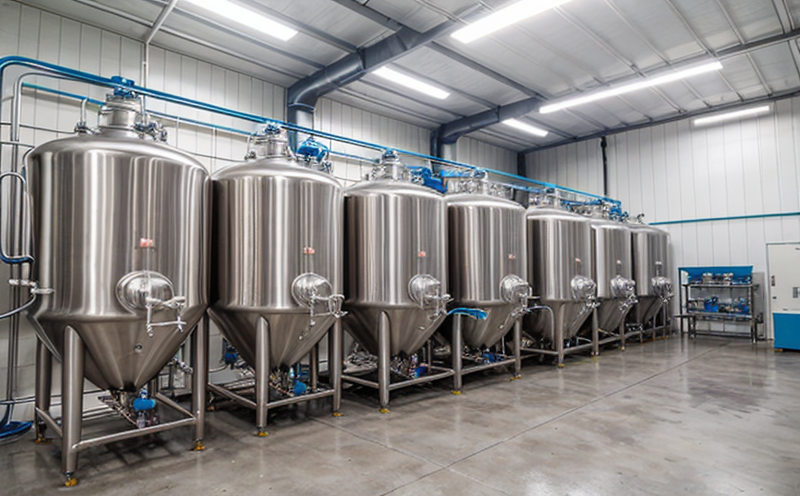OECD 301 Ready Biodegradability Testing in Fermentation Products
In the realm of industrial fermentation and biotechnology microbiology, ensuring that fermentation products are environmentally friendly is a critical concern. The OECD 301 ready biodegradability test is an essential tool for assessing this aspect. This stringent testing protocol evaluates whether a substance can be readily biodegraded within a defined period by microorganisms in the environment. Understanding its significance and how it impacts your business is crucial.
Biodegradability testing is especially important as regulatory bodies around the world are increasingly focusing on sustainable practices. Compliance with these standards not only ensures that you meet legal requirements but also enhances your company's reputation among customers who prioritize environmental responsibility. The OECD 301 test specifically examines how quickly and thoroughly a substance can be broken down by microorganisms, which is particularly relevant when dealing with fermentation products.
The test involves inoculating the sample with activated sludge from a wastewater treatment plant or another specified source, then incubating it under controlled conditions. After a set period (typically 28 days), the biodegradation rate is assessed based on parameters such as carbon dioxide evolution and weight loss. This process helps determine if the fermentation product can be safely released into the environment without causing harm.
For quality managers and compliance officers, this test provides assurance that their products will comply with international standards like ISO 14026 and OECD guidelines. For R&D engineers, it offers valuable insights into optimizing fermentation processes to produce more environmentally friendly outcomes. Additionally, procurement teams benefit from knowing they are sourcing materials or ingredients that meet rigorous environmental criteria.
The OECD 301 test is not just about meeting regulations; it's also about reducing risks associated with non-compliance and enhancing brand value by demonstrating a commitment to sustainability. By incorporating this testing into their product development and manufacturing processes, companies can stay ahead of evolving standards and maintain competitive advantage in the market.
- Enhanced Environmental Reputation: Demonstrating compliance through rigorous biodegradability tests enhances brand image and builds trust with environmentally conscious consumers.
- Reduced Compliance Risks: Ensuring products meet regulatory requirements reduces the likelihood of fines, penalties, or legal actions.
- Innovation Opportunities: Insights gained from biodegradability testing can drive innovation in sustainable product development and manufacturing processes.
Why It Matters
The OECD 301 test is crucial for several reasons. Firstly, it helps companies comply with international standards such as ISO 14026, which sets criteria for environmental labels and declarations. Secondly, it ensures that products do not pose unnecessary risks to the environment if released into wastewater streams or landfills.
From a business perspective, this test is vital because it can influence customer perception and purchasing decisions. Consumers are increasingly aware of the environmental impact of the products they buy, and having certification for biodegradability can be a significant selling point. Moreover, regulatory bodies around the world are implementing stricter rules regarding waste management and pollution control.
For businesses operating in industries such as chemical manufacturing, pharmaceuticals, and consumer goods, compliance with these standards is not just beneficial; it's often mandatory. Failure to comply can result in legal penalties, reputational damage, and loss of market share. Therefore, investing in comprehensive biodegradability testing like the OECD 301 ensures that you are prepared for future changes in regulations while maintaining a strong market position.
Additionally, this test provides valuable data that can inform ongoing research and development efforts. Understanding how different factors influence the biodegradability of fermentation products allows companies to refine their processes continuously, leading to more efficient operations and potentially reducing costs associated with waste management.
Customer Impact and Satisfaction
Meeting stringent environmental standards through tests like OECD 301 can significantly enhance customer satisfaction. In today's environmentally conscious market, many consumers prefer to support companies that prioritize sustainability. By demonstrating compliance with these standards, businesses can appeal to this growing demographic.
The test results also provide customers with transparency about the lifecycle of their products. Knowing that a product is biodegradable and does not pose significant risks to the environment reassures them about its safety and eco-friendliness. This level of assurance can lead to increased loyalty and repeat business.
Furthermore, compliance with such tests can open up new market opportunities in regions where environmental regulations are stringent or growing in importance. Companies that are ahead of these trends tend to gain a competitive edge over those lagging behind. Satisfied customers often recommend products and services to others, further boosting brand reputation and market share.
For businesses seeking to expand their product lines or enter new markets, compliance with OECD 301 can be a key differentiator. It shows that the company is committed to meeting global standards of environmental responsibility, which is increasingly important for international trade.
Competitive Advantage and Market Impact
- Environmental Leadership: By leading the way in biodegradability testing, companies can set a benchmark for competitors. This leadership positions them as industry leaders in sustainability.
- Customer Trust: Demonstrating compliance with rigorous environmental standards builds trust among customers, which is essential in today's competitive market.
- Innovation Incentive: The insights gained from biodegradability testing can drive innovation and continuous improvement in product development processes.
- Regulatory Compliance: Meeting these standards ensures that businesses are compliant with current regulations, avoiding potential legal issues and penalties.
- Market Access: In some regions, compliance is a requirement for market access. By being ahead of the curve in biodegradability testing, companies can secure entry into these markets more easily.
- Sustainability Leadership: Leading in sustainable practices can enhance brand reputation and attract investors who prioritize environmental responsibility.





